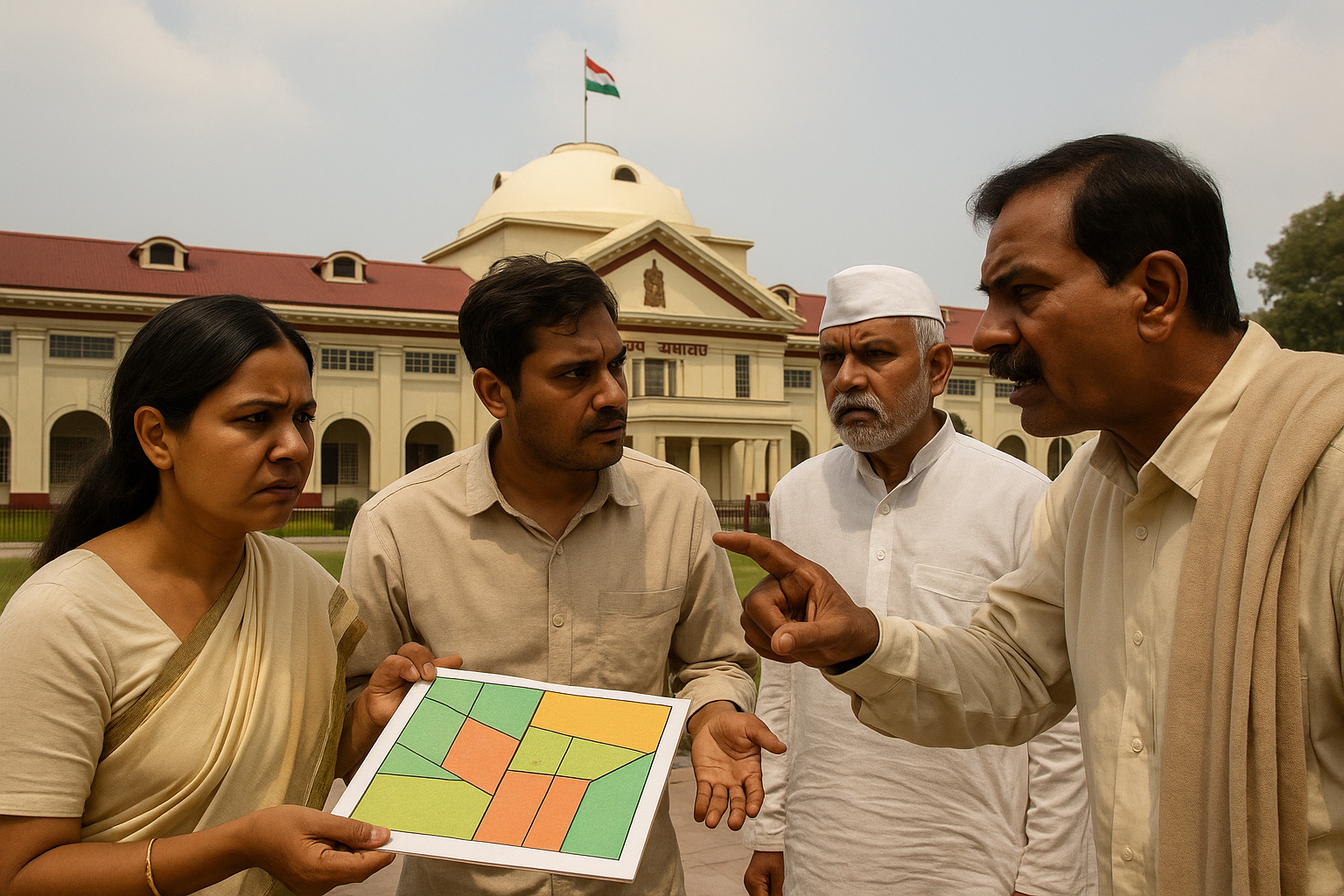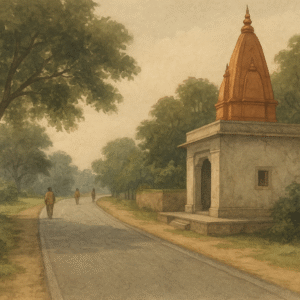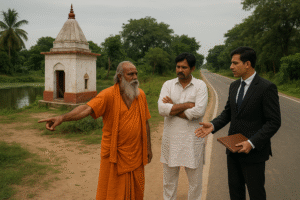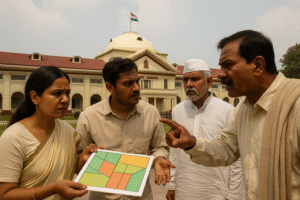Simplified Explanation of the Judgment
The Patna High Court, in a decision delivered on 10 November 2022, addressed an important procedural question concerning amendments in civil suits. The matter arose from a partition suit pending before the Sub-Judge-II, Kaimur at Bhabhua. The case revolved around whether a plaintiff can seek to amend her plaint to include additional properties as part of the joint family estate even after the trial has begun.
The petitioners in this case were the defendants in the partition suit (Title Suit No. 261 of 2007), while the respondent was the plaintiff claiming to be the legally wedded wife of a deceased family member and seeking a one-half share in the joint family property.
Background of the Dispute
The plaintiff (respondent here) had filed the partition suit claiming half ownership in several plots of land described in Schedule-A of her plaint. She stated that these lands belonged to the joint family consisting of herself and the petitioners. The petitioners (defendants), however, denied her marital relationship with the deceased Bindhyavasni Singh, asserting that she was an impostor and not his lawful wife. They also argued that the properties were already partitioned earlier and that the land recorded in their names was their exclusive property, not part of any joint estate.
During the pendency of the suit, the plaintiff discovered that some additional lands (specifically in Khata Nos. 143 and 219) were also recorded jointly in the names of the deceased, one of the defendants, and herself. She then filed an amendment petition on 25 January 2018 to include those new plots in the partition suit. The trial court allowed the amendment on 16 April 2018, reasoning that adding those plots would not change the nature of the case and was necessary for complete adjudication.
The defendants challenged that order before the High Court under its Civil Miscellaneous Jurisdiction, arguing that the amendment was time-barred, mala fide, and filed after the commencement of trial without showing due diligence.
Petitioners’ Arguments
- Delay and Lack of Diligence:
The petitioners contended that the amendment came much after the trial had started and violated the proviso to Order VI Rule 17 of the Code of Civil Procedure (CPC), which restricts amendments after commencement of trial unless the party shows “due diligence.” - Exclusive Ownership:
They claimed that the properties in question (Khata Nos. 143 & 219) had already been settled exclusively in the name of one defendant, Deo Sharan Singh, under a compromise decree passed in Title Suit No. 66 of 1961. Hence, those plots could not be treated as joint family property. - Change in Nature of Suit:
They argued that including new properties at this stage would substantially alter the scope and character of the partition suit. - Reliance on Precedents:
The petitioners cited several precedents to emphasize that belated amendments without due diligence should not be allowed, including:- Vidyabai v. Padmalatha, (2009) 2 SCC 409
- Sanjay Kumar v. State of Bihar, 2011 (4) PLJR 515
- Brahmanand Choudhary v. Narayani Devi, 2015 (3) PLJR 448
- Sayed Hasibuddin v. Syed Md. Akram Hussain, 2006 (4) PLJR 260
Respondent’s Counter-Arguments
The respondent (plaintiff) maintained that:
- The case was a partition suit, where the question of ownership and share determination continues until the final decree.
- Including additional properties would not change the nature of the suit but would help in ensuring that all family assets were brought within the purview of the court.
- Allowing the amendment would avoid multiplicity of proceedings, as she would otherwise have to file a fresh suit regarding the newly discovered properties.
- The delay was not deliberate — the relevant land records had come to her knowledge only later.
Her counsel relied upon:
- Chander Kanta Bansal v. Rajinder Singh Anand, (2008) 5 SCC 117
- Maksoodan Khatoon v. Akhtari Begum, 2005 (4) PLJR 618
Court’s Observations and Reasoning
Hon’ble Mr. Justice Anil Kumar Sinha analyzed the scope of Order VI Rule 17 CPC, noting that while the proviso restricts late amendments, courts retain discretion to allow them if they are necessary for effective adjudication and do not cause injustice to the other side.
The Court cited the Supreme Court’s interpretation in Chander Kanta Bansal that the key consideration is to prevent multiplicity of proceedings and to ensure justice — not to rigidly shut out legitimate amendments.
The High Court emphasized that:
- In a partition suit, the inclusion of new properties does not necessarily change the nature of the case because the core question remains the same — whether the plaintiff is entitled to a share and whether the properties are joint family assets.
- The trial court had correctly found that the proposed amendment did not alter the cause of action or character of the suit.
- The petitioners (defendants) had already led evidence regarding whether the plaintiff was the lawful wife and whether the properties were joint family properties. Hence, they suffered no real prejudice from the amendment.
Final Decision
The High Court held that the trial court had exercised its discretion properly in allowing the amendment. The Court observed:
“By addition of certain plots in the suit for partition, definitely it shall not prejudice the defendants, and by allowing the amendment, multiplicity of proceedings can be avoided.”
Therefore, the High Court dismissed the defendants’ Civil Miscellaneous Petition (C.Misc. No. 892 of 2018), upholding the trial court’s order permitting amendment. However, it granted liberty to the defendants to file an additional written statement if they wished to respond to the amended pleadings.
Significance or Implication of the Judgment
- Flexibility in Partition Suits:
The decision reinforces that partition suits, being ongoing and composite in nature, can accommodate amendments to include newly discovered properties to ensure a full and fair division of family assets. - Due Diligence Requirement Interpreted Practically:
The Court adopted a pragmatic approach to “due diligence,” holding that it means reasonable care, not exhaustive perfection. If the omission was bona fide and not intentional, late amendment can still be allowed. - Avoiding Multiplicity of Litigation:
By permitting the amendment, the Court avoided the need for a separate suit, saving time and judicial resources. - Guidance to Civil Courts:
The judgment provides clear guidance for subordinate courts to apply liberal principles while balancing fairness and procedural discipline under Order VI Rule 17 CPC. - Protecting Both Sides:
The Court ensured fairness by allowing the defendants an opportunity to amend their written statement in response to the new pleadings.
Legal Issues and the Court’s Decision
- Whether the plaintiff could amend her plaint to include new properties after the trial began?
✔️ Yes. The High Court held that the amendment was necessary for complete adjudication and did not change the nature of the suit. - Whether lack of due diligence barred such an amendment?
❌ No. The Court found that the plaintiff acted reasonably and that the newly included properties came to her knowledge only later. - Whether allowing amendment would prejudice the defendants?
❌ No. They could file an additional written statement; thus, no irreparable prejudice was caused.
Judgments Referred by Parties
- Vidyabai v. Padmalatha, (2009) 2 SCC 409
- Sanjay Kumar v. State of Bihar, 2011 (4) PLJR 515
- Brahmanand Choudhary v. Narayani Devi, 2015 (3) PLJR 448
- Sayed Hasibuddin v. Syed Md. Akram Hussain, 2006 (4) PLJR 260
- Chander Kanta Bansal v. Rajinder Singh Anand, (2008) 5 SCC 117
- Maksoodan Khatoon v. Akhtari Begum, 2005 (4) PLJR 618
Case Title
Defendants (petitioners) vs. Plaintiff (respondent) in a Partition Suit involving joint family properties of Kaimur District, Bihar.
Case Number
Civil Miscellaneous Jurisdiction No. 892 of 2018
arising from Title Suit No. 261 of 2007
Citation(s)
2023 (1) PLJR 5
Coram and Names of Judges
Hon’ble Mr. Justice Anil Kumar Sinha
Names of Advocates and Representation
- For Petitioners: Mr. Ashutosh Nath, Mr. Kunal Aryan, Mr. Binod Kumar, Advocates.
- For Respondent: Mr. J. S. Arora, Senior Advocate; Ms. Shashi Bala Verma, Advocate.
Link to Judgment
NDQjODkyIzIwMTgjMSNO-1MCwAIIph6I=
If you found this explanation helpful and wish to stay informed about how legal developments may affect your rights in Bihar, you may consider following Samvida Law Associates for more updates.








